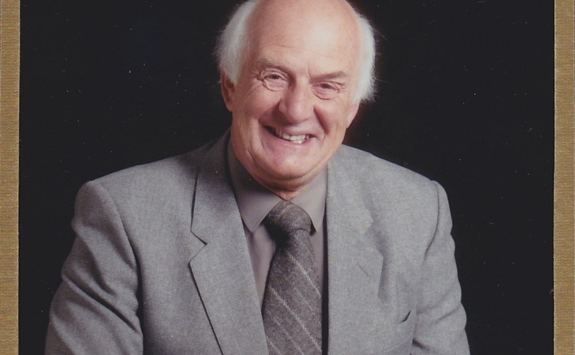Meet the Class of 1944 alumnus who dedicated his career to supporting deaf children
Dr Geoffrey Chaytor, who graduated in Medicine from King’s College in 1944, spent his career supporting young children and babies with hearing difficulties and lobbied the government to provide these children with a quality education. This is his story.
20 February 2024
Early life
Born Robert Geoffrey Chaytor in 1922, Geoffrey joined King’s College (which became Newcastle University in 1963) at the start of World War Two. He qualified as a doctor in 1944 and went on to serve 3 years in the Royal Army Medical Corp, travelling to Burma, Egypt, Palestine and Sudan.
At the end of the war, Geoffrey returned home to the North East and trained as an ENT surgeon. He was appointed a consultant in 1952 and was part of the team that opened the new Walkergate Hospital – which included a 30-bed Ear, Nose and Throat ward – in 1953.
This modernised hospital replaced the original Walkergate Hospital which was built in the late 1800s and had operated as the fever hospital for the area.
-1.png)
Lobbying for change
As a consultant, Geoffrey’s main interest was hearing difficulties in young children and babies. Prior to the establishment of the National Health Service in 1948, these young children were misunderstood and never given the opportunity to learn to speak, never mind offered formal education. Instead, they were left institutionalised in psychiatric hospitals having been misdiagnosed with mental illness. This was sadly still the case a few years later when Geoffrey was working at Walkergate Hospital.
Geoffrey was one of just a handful of consultants in the UK at the time who tested hearing and fitted hearing aids. This group lobbied the government to objectively test the hearing of all infants and children and to recognise that their hearing difficulties weren’t a reflection on their overall intelligence. Eventually, the Department of Health issued a white paper making it the requirement of local authorities to discover children with hearing difficulties and educate these children fully.
Following the publication of this white paper, Geoffrey committed to educating health visitors on how to assess hearing and continued to lobby for deaf children to be educated in mainstream schools, with the help of hearing aids and specially-trained teachers. Eventually, those health visitors became audiometrists, a new NHS role.
Geoffrey's legacy
When the ENT unit at Walkergate was amalgamated with the other two units in Newcastle, Geoffrey felt it was time to take retirement in 1982. His work lives on through the regional centre for deaf children which eventually became integrated into the Child Development Centre in the Royal Victoria Infirmary, and the British Society of Audiology, of which he was the founder. One of his proudest moments, though, was receiving a letter from the mother of a child he had helped who had just attained her degree.
In retirement, Geoffrey was able to extend a lifelong interest in photography, particularly in natural history, in which he gave illustrated talks over seven decades. He retired to Allendale, in the foothills of the North Pennines, and took an active part in the running of St Cuthberts Church.

